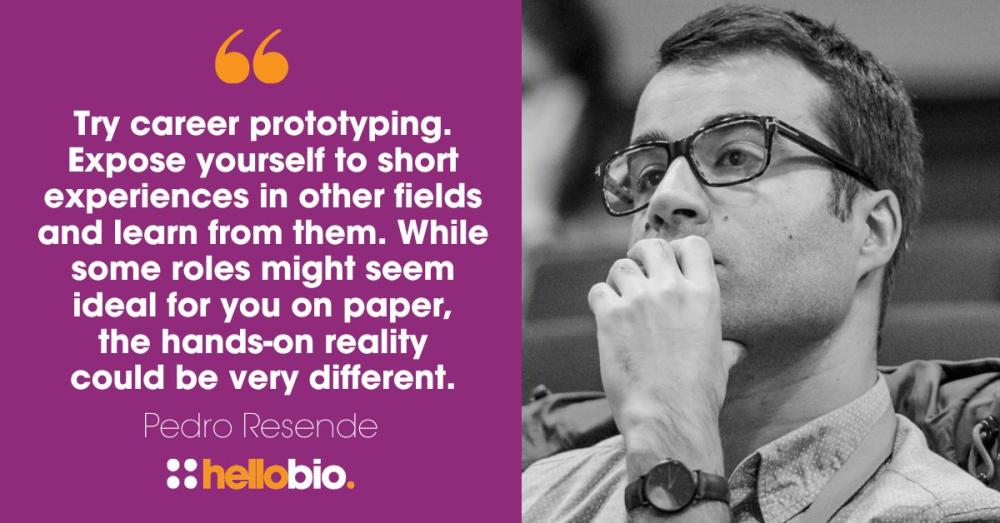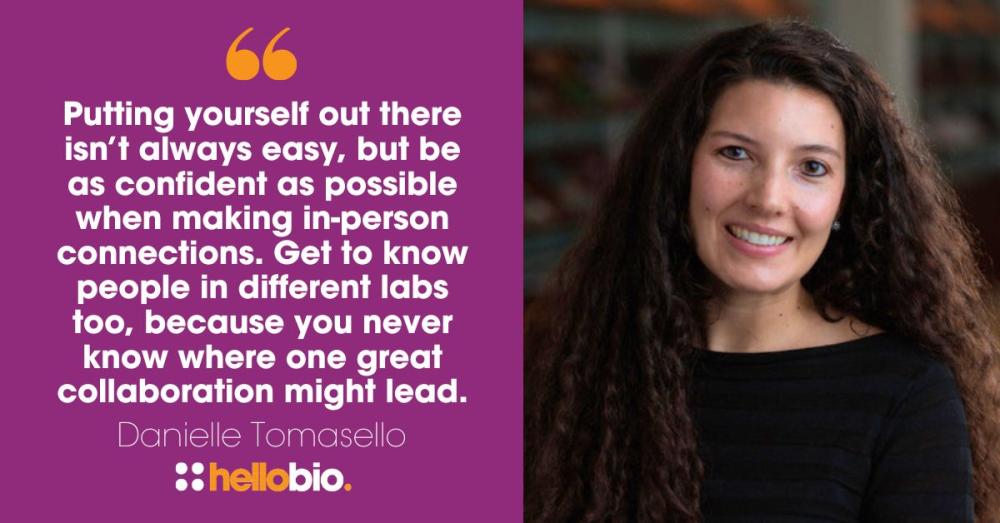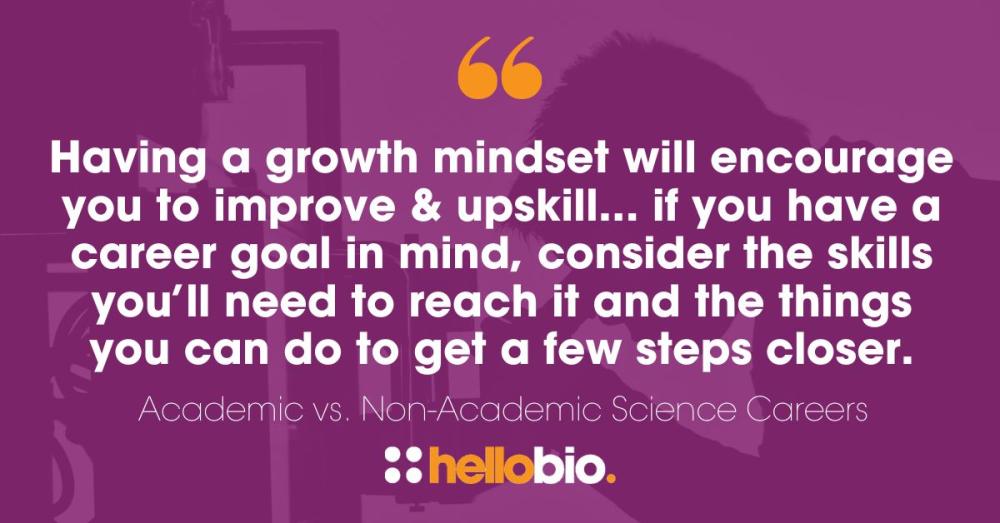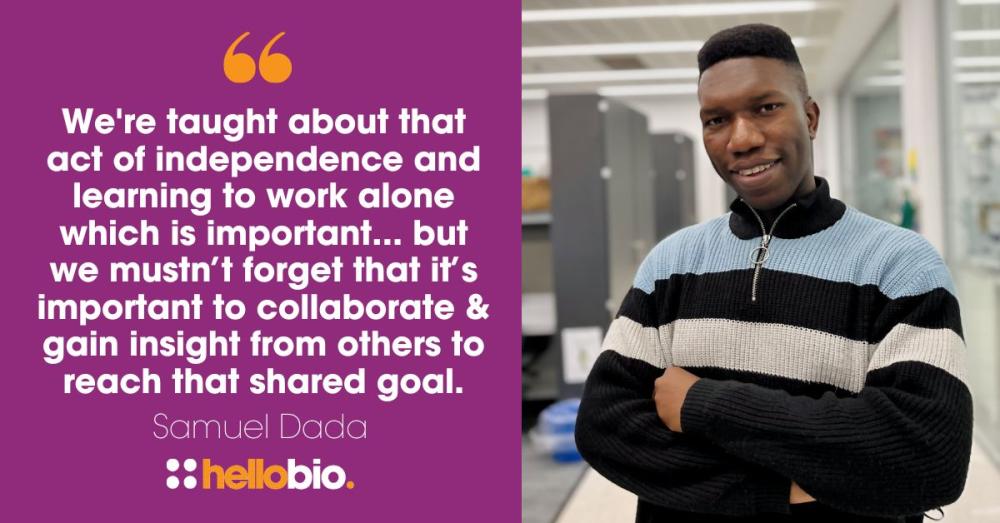Academic vs. Non-Academic Science Careers (and choosing the right path)
For life scientists in the early stages of their careers, there’s much to consider when deciding on a future career path. Many researchers find themselves torn between a ‘traditional’ academic career at a university, or a non-academic role working for a commercially-focused company or organisation. Both paths have their pros and cons, and it’s important to consider all the factors if you’re thinking about a future transition from one to the other.
In this article, we look at the important differences between the two career paths, and offer effective ways of navigating the best route for you. We also share advice from Pedro Resende of Chaperone, and Danielle Tomasello of The Social Scientist, who are experts in career guidance and mentoring for life scientists. They share their top tips for identifying suitable career paths, and highlight the professional skills you need to give yourself the greatest chance of success, whichever route you choose!
Academia vs. Non-Academia: an overview
Careers in academia
A job role in academia will typically be based at a university or other educational research institute and will involve teaching, mentoring, and collaborating with other academics in your field. Academic research generally involves the pursuit of knowledge, with the freedom to explore diverse topics. Funding is usually obtained via applications for grants from government agencies or private foundations. Career progression often follows a hierarchical structure, from PhD and postdoc positions, moving up to tenure-track faculty roles and eventually professorship or administrative positions.
Some typical advantages and disadvantages of working in academia:
PROS:
- Freedom to carry out research on diverse topics
- High level of job security at tenure-track level
- Development of valuable teaching skills and experience
- Retaining the ownership of any discoveries made, with personal achievements recognised through papers and journals
- Contribution to the wider research world through teaching and mentoring the scientists of the future
CONS:
- Pursuit of funding is difficult and highly competitive
- Salaries are typically lower than those within industry
- Potential for a poor work-life balance, with long hours and pressure to publish papers
Non-academic science careers
Science careers in non-academic ‘industry’ settings will typically be with pharmaceutical companies, biotech firms or contract research organisations (CROs) whose focus will be on developing new products, technologies or therapies for commercial sale. Non-academic careers can also include roles in science communication, policy and consultancy. Research targets will be set based on market demands, and work is generally funded by the company itself. A career in industry would follow a path that moves up in seniority from researcher to project manager, team leader, and eventually a managerial or executive position.
Some typical advantages and disadvantages of working in a non-academic role:
PROS:
- Good working conditions with structure and predictable working hours
- Higher salaries, including perks such as bonuses or stock options
- Good access to regular and stable sources of funding
- Development of valuable skills in business, management, communications and entrepreneurship
- Finding solutions for real-world problems and seeing them applied
CONS:
- Project themes and research focus will be dependent upon market demands
- Intellectual property such as patents for new innovations or discoveries will typically be owned by the company
- Strict regulations and quality compliance within research
- Job security may vary due to market fluctuations
Which path is right for you?
Choosing the right career path for you will depend on your individual priorities, values, and career aspirations. Reflect on the type of impact and fulfilment you seek from your science career, and thoroughly research and explore all the options before making a decision.
Gather information and gain experience
Pedro Resende stresses the importance of gathering as much information as possible. He told us: “Make informed decisions. I would recommend talking to both people who have opted to stay in academia, and those who have recently left. Seek advice from people who are experienced in careers guidance such as counsellors, coaches and advisors, as well as your supervisors and mentors. They are all relevant stakeholders who should be able to help answer questions about your career options.”
Danielle Tomasello agrees that reaching out to your mentors and sharing your thoughts or concerns is one of the best ways to gain valuable career advice. She said: “I would not be where I am today without great mentors. Their advice really is indispensable, because not only do they have professional knowledge of different fields, institutes and companies, they also have knowledge about you and your passions, strengths and weaknesses. I've gotten so much great career advice from mentors that I simply could not have gotten anywhere else.”
Pedro also suggests experimenting where possible with job shadowing or work experience placements in different areas as a way of gaining some insight into different job roles within STEM: “Rather than career planning, try career prototyping. Expose yourself to different short experiences in other fields, and learn from them, because some roles might seem ideal for you on paper, but the hands-on reality could be a very different experience. There is no point committing to something new if you aren’t sure it’s definitely what you want to do. Use these short-term, temporary experiences to boost your long-term options.”
Build a professional network
Being proactive with networking is one of the best ways to not only learn about the day-to-day reality of different job roles and working environments, but also to stay on top of any upcoming opportunities. Use professional online platforms such as LinkedIn to keep a look out for job roles or short-term positions that might allow you to gain valuable experience in other fields. Use social media to contact people working in different areas and don’t be afraid to ask for their advice or opinions on specific matters.
Danielle recommends attending career events and collaborating with others in order to open up new doors: “Seek out career fairs and other event opportunities because they can be very helpful. If you’re attending a conference, find out who the speakers are and consider whether they might be able to give you any advice. Putting yourself out there isn’t always easy, but be as confident as possible when it comes to making in-person connections. Get to know other people in different labs too, because you never know where one great collaboration might lead.”
For more advice on effective networking and building a strong online profile, take a look at this great article by Dr Elodie Chabrol: Mastering Networking for Science: How to Boost Your Profile.
Develop a growth mindset
Any career advisor will tell you that in order to keep your job options open it’s essential to continually build on your existing skills. Having a growth mindset will encourage you to constantly improve and upskill, which can only have a positive effect on your career progression. If you have a specific career goal in mind, think hard about the skills and qualities you need to reach that goal, and what you can do to take yourself a few steps closer.
Pedro stresses the importance of a growth mindset: “Having a growth mindset is super important. You need to be constantly willing to improve not only yourself, but also to have the mentality to fully embrace the project you are working on, or the team you are working with, and want to improve them too. When you leave, you want to know that the project or team you were part of is now in a better and stronger place than it was before.”
Take care of yourself
Something that’s often neglected, particularly in the world of academia, is the importance of maintaining good health and wellbeing. The challenges that accompany academic roles can be punishing, with tough work schedules, a poor work-life balance, competition for funding and the constant pressure to publish. If your heart is set on a long-term career in academia, it’s essential to think about ways to manage your mental and physical health when such challenges arise. Pedro says: “I've seen many colleagues who are excellent professionals, with great potential, neglect their health and wellbeing which nearly always has a very negative impact on their careers. It's so common in academia, in fact two out of five academics have suffered from depression during their careers. Health and wellbeing skills are something that we all should develop as science researchers.”
For more advice and practical tips on maintaining good mental health and wellbeing in STEM, take a look at these great resources from Hello Bio: Mental Health & Wellbeing for Scientists: Support Pack
Essential skills for success
So what are the most vital skills to develop for success in life science? Which qualities will be most useful to you when working in academia, or transitioning to industry? We asked the experts and they share their top five tips for career skills development:
Learn how to...
1) Manage others
Danielle recommends gaining management skills if you hope to lead a team in an academic environment. She said: “The top skill that absolutely none of us are taught is management. I asked my mentor, what has been the hardest thing about working in academia? And she said, it's not about grant writing, it's not about papers, it has everything to do with managing her team. That has been the hardest thing. So learning management skills, and learning how to individualise management based on the person's needs is essential for success in academia.”
2) Multitask & prioritise
For success in any field of STEM, the ability to multitask is incredibly useful for keeping on top of busy workloads. Research work in both academic and non-academic fields will involve working to deadlines, so being able to juggle multiple tasks will give you the edge when working towards your career goals. Danielle says: “I would say multitasking is very important, and figuring out how to prioritise the most necessary tasks at any given moment is essential for success. Try not to get too bogged down with heavy workloads and learn scheduling techniques to help with project planning.”
3) Communicate effectively
Clear and concise communication is another essential skill you should master if you’re hoping to climb the STEM career ladder. Take any opportunity you can to write about your science (write for the Hello Bio blog!), and learn to express yourself in ways that display your true passion for research. Danielle says: “I think that no matter what field you go into, being able to communicate your science well, and being able to do quick elevator pitches about your research work is very useful overall.”
4) Negotiate
No matter which career path you choose, another valuable skill to hone is the ability to negotiate. Science research almost always involves working with others, so the ability to reason and negotiate with colleagues or senior staff when needed can be hugely beneficial to your career development. Pedro told us: “In academia you will often find that you need to negotiate different things with your supervisor, for example, or argue a rebuttal letter. It’s a very useful skill to have for positive career progression.”
5) Collaborate
And finally, learning the art of effective collaboration is vital for success in science. In both academic and non-academic roles, teamwork and collaboration will almost always be part of your daily work, so learning to pull together towards a common goal will help you to stay ahead of the game. Samuel Dada, a PhD student at the University of Cambridge shared his thoughts on collaboration: “I think the importance of collaboration is sometimes neglected, especially when you're in a kind of PhD sphere. We're taught about that act of independence and learning to work by ourselves, which is important. But we mustn’t forget that it’s also important to collaborate and gain insight from others to reach that shared goal. And it’s something that applies to any workplace, not just in academia, it will be helpful wherever your career takes you.”
Give it your best shot
Whichever career path you choose to take, give it your best shot and remember that if things don’t work out, you aren’t trapped in it for life! There will always be other options, and having a more varied career might turn out to be more rewarding for you in the long-term.
Danielle told us: “I have a number of friends that have left academia and are much happier in biotech, or science communication. And I have plenty of friends that have stayed in academia, and they absolutely love it. I think there are so many aspects that contribute to your career path, and ultimately how happy you are in your career. If you’re not happy, there's absolutely no reason to stay in that field. But I think it’s important to give it your best shot. If you are really interested in academia, do your best, find a great postdoc, try to hit all the hallmarks related to academia such as getting fellowships, being independent, getting published, and just give it a try!”
---------------------------------------------------------------------
Watch the full panel discussion at the Hello Bio LabLife Conference 2024
This article is based on content from a panel discussion on Academic vs Non-Academic Science Careers (and choosing the right path) at the Hello Bio LabLife Conference on 18th January 2024. You can watch the full discussion on the Hello Bio YouTube channel:
About the contributors
PEDRO RESENDE
In addition to being the Co-founder and Director of Chaperone, Pedro Resende is also a biomedical researcher at i3S. He has more than 20 years of experience in the Life sciences/Biomedical sector. An alumnus of University of Porto, Pfizer, Salk Institute and UCLA, he has worked in three countries (Portugal, UK and USA) and experienced different roles in academia, industry, government and third sector. Pedro co-founded two academic associations and one startup, and has also worked as External Consultant for the area of Innovation at the Ministry of Health, Portugal.
- Interviews with Scientists: Pedro Resende
- Chaperone supports the Hello Bio Early Career Scientist Grant initiative
Connect with Pedro & the team at Chaperone:
- X(Twitter): @peperesende / @ChaperoneOnline
- LinkedIn: Pedro Resende
- Instagram: @chaperone.online
- Website: https://chaperone.online/
DANIELLE TOMASELLO
Danielle Tomasello is a Postdoctoral Researcher at the Whitehead Institute for Biomedical Research. Her research is focused on metabolic changes in the human brain of those affected by neurodevelopmental disorders. She is the founder and creator of non-profit organization The Social Scientist, a one-on-one virtual mentorship platform for the STEM community.
Connect with Danielle & The Social Scientist:
- X(Twitter): @TheSocScientist
- LinkedIn: Danielle Tomasello
- Instagram: @thesocscientist
- Website: https://www.thesocialscientist.org/
Getting Accustomed to Rejection - guest blog by Danielle Tomasello
SAMUEL DADA
Samuel Dada is a PhD student in the Department of Chemistry at the University of Cambridge. Before commencing his PhD, Samuel served as a research assistant at Imperial College London while also demonstrating and teaching a molecular biology practical course at New York University. Sam's current research focuses on protein misfolding in neurodegenerative diseases, with a specific emphasis on understanding the mechanisms and kinetics of alpha-synuclein aggregation linked to Parkinson's disease.
Connect with Samuel:
- X(Twitter): @StoDada
- LinkedIn: Samuel Dada
- Instagram: @stodada
Taking Positive Steps Towards PhD Success - guest blog by Samuel Dada
More career advice from the Hello Bio blog
For more career tips and advice for life scientists, check out some of these great resources available on the Hello Bio blog:
- STEM Career Paths for Life Scientists
- Ten Essential Soft Skills for Life Scientists
- Parenting and a Science Career: Perspectives of a Mother in Academia
- How the Hello Bio Early Career Scientist Grant helped my career
________________________________
If you enjoyed this article, why not check out the other resources available on our blog. We are passionate about supporting life scientists including early career life scientists and PhD students - with really low-priced reagents, antibodies and biochemicals, early career scientist grants, and resources to help with both personal and professional development. We know how tough it is - so we hope you find these helpful!
More General Support for Life Scientists
For advice on wellbeing, dissertations, presenting at conferences, wellbeing, PhD support, networking and lots more, we have a huge range of articles to help - just click below:
Save up to 50% on our high purity reagents...
When you get to the stage of planning your experiments, don't forget that we offer a range of low-cost, high-purity agonists, antagonists, inhibitors, activators, antibodies and fluorescent tools (yes - they really are around half the price of other suppliers!) You can use our Quick Multi-Search Tool to search for lots of products in one go, and the range includes:
- Enzyme inhibitors and activators
- Chemogenetic ligands
- Ion channel modulators
- GPCR & ionotropic receptor ligands
- Cell biology reagents & biochemicals
Technical resources
Try our Molarity Calculator: a quick and easy way to calculate the mass, volume or concentration required for making a solution.
Try our Dilution Calculator: an easy way to work out how to dilute stock solutions of known concentrations
We also offer a comprehensive range of technical resources including antibody protocols and methods, product guides and mini-reviews:
And finally, don't forget to check back in with our blog regularly for our latest articles. If there’s something you’d love to contribute to the community, whether that’s an interview or article, drop us a line at hello@hellobio.com
---



























